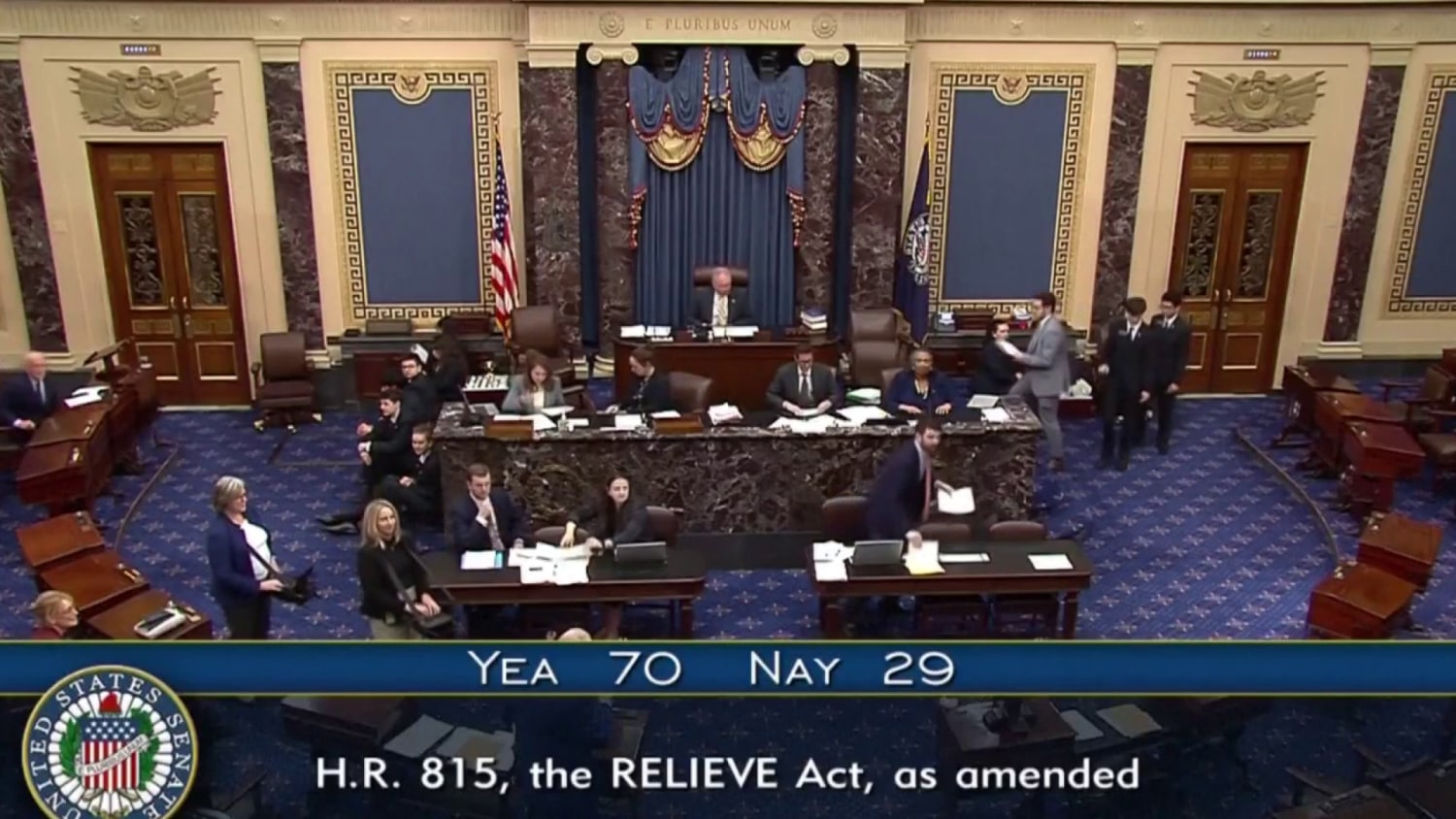WASHINGTON ((JEWISH REVIEW)) — The U.S. Senate overwhelmingly approved a defense aid package for Israel, Ukraine and Taiwan, including humanitarian assistance for Palestinians, that now faces a difficult path in the Republican-led House of Representatives.
The bill, approved 70-29 in a bipartisan vote before dawn on Tuesday after weeks of wrangling, is the latest bid to provide Israel with billions of dollars in emergency funding for its war with Hamas. It comes after the Senate failed last week to pass a bill that would have included funding for increased security at the U.S.-Mexico border in addition to the supplemental foreign aid.
“With this national security bill, the Senate keeps its word to Ukrainians in need of supplies, to innocent Palestinian civilians in need of relief, to Israelis in need of support, and to U.S. service members on patrol in the Indo-Pacific, the Red Sea, and around the world,” Sen. Chuck Schumer, the Jewish Democrat from New York who serves as majority leader and shepherded through the bill, said in a series of posts on X, formerly Twitter, celebrating the passage.
The $95.3 billion bill includes $14.1 billion in assistance for Israel, $9.2 billion in emergency humanitarian assistance for Palestinians and $60 billion for Ukraine.
Rep. Mike Johnson, the Louisiana Republican who is speaker of the House of Representatives, was highly critical of the new bill. But he did not count it out as he had done with last week’s version, which had included the border components, and which he had said was “dead on arrival” — in part due to opposition from former President Donald Trump, who is the likely Republican presidential nominee.
Johnson said the bill should have included immigration components — although he previously proposed a bill that provided Israel assistance without immigration components.
The Senate “should have gone back to the drawing board to amend the current bill to include real border security provisions that would actually help end the ongoing catastrophe,” Johnson said in a statement. “Instead, the Senate’s foreign aid bill is silent on the most pressing issue facing our country.”
But he hinted that instead of burying the Senate bill outright, he would advance a House version that also addresses the border. That leaves open the possibility of both bills being reconciled, a way Congress can push forward different versions of major spending legislation passed by each chamber.
“The House will have to continue to work its own will on these important matters. America deserves better than the Senate’s status quo,” Johnson said.
The debate ahead of the vote also resurfaced tensions among Democrats about Biden’s support for Israel, which has proven unpopular among younger voters and those on the left. Three senators in the Democratic caucus voted against the funding, saying that Israel was ignoring Biden’s pleas to conduct the war with greater care for Palestinian civilians.
“This bill provides Netanyahu $10 billion more in unrestricted military aid for his horrific war against the Palestinian people,” Bernie Sanders, the Jewish Vermont senator, said before the vote. “That is unconscionable. I will vote NO on final passage.”
A factor frustrating any advance of the bill in the House is that its Republican caucus is heavily influenced by the declarations of Trump who, as he advances toward a rematch with President Joe Biden, is dead set on denying Biden legislative victories. Trump also opposes aiding Ukraine and recently suggested in a speech that he would urge Russia to attack American allies who don’t pay enough toward their own defense.
“The United States of America should be ‘stupid’ no longer!” Trump said Saturday in all-caps on the Truth Social media platform he partly owns, advising Republicans in the Senate to oppose the bill.
Trump’s animus toward Ukraine is a factor, but ominously for the pro-Israel community, which for decades has advocated straightforward grants to foreign allies, Trump said in his post that all foreign aid should now come in the form of loans.
“From this point forward, are you listening U.S. Senate(?), no money in the form of foreign aid should be given to any country unless it is done as a loan, not just a giveaway,” he said, again in all-caps. “it can be loaned on extraordinarily good terms, like no interest and an unlimited life, but a loan nevertheless.”
Notably, one of Israel’s staunchest Senate defenders, Lindsey Graham, a South Carolina Republican and Trump ally, voted against the Senate bill and embraced Trump’s formula of turning Grants into loans. “The supplemental aid package should be a loan to the countries in question, as suggested by President Trump,” he said after the vote.
The vote was delayed in part by procedural motions from a small cadre of Republican senators, like J.D. Vance of Ohio, Rand Paul of Kentucky and Mike Lee of Utah, who, like Trump, distrust Ukraine.
Still, the aid package earned the backing of 22 Senate Republicans, many of whom are liberated from Trump’s pressures by six year terms, and by having to win an entire state, as opposed to House districts, which increasingly are gerrymandered to favor one party or the other.
If Johnson insists on attaching border policies to any reconciled bill, which must then pass both chambers, the funding could yet disappear into congressional deadlock. Democrats say the bill Republicans rejected last week is the farthest they were willing to go regarding restrictions on the border, something affirmed by its main Republican author, Sen. James Lankford of Oklahoma.




